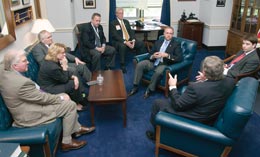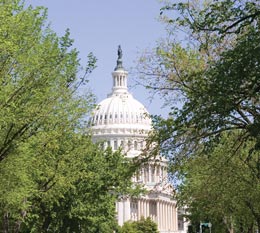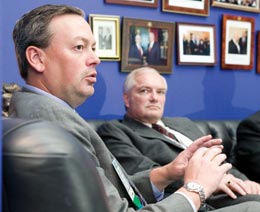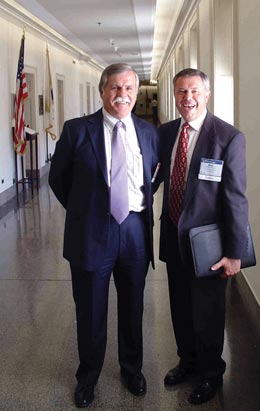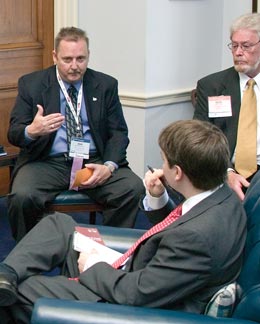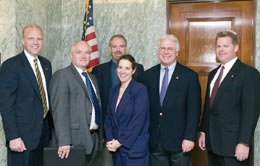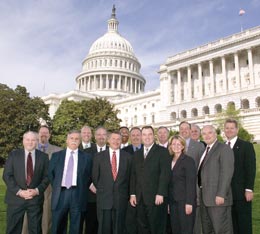 |
 |
 |
|
Heading for the Hill Independent agents take their issues to Capitol Hill By Elisabeth Boone, CPCU In Washington, D.C., April is most famously known as cherry blossom time, but it’s also a time when members of the Independent Insurance Agents & Brokers of America (IIABA) from across the country call on their elected representatives in the House and Senate. Known as the National Legislative Conference, this year’s annual pilgrimage to Capitol Hill was held in conjunction with the “Big I’s” annual convention. The conference drew thousands of attendees from all 50 states for a briskly paced agenda of networking and lobbying. Rough Notes accompanied some of the Indiana delegation on its visits to that state’s elected officials on Capitol Hill. Seeing the process “up close and personal” both dispelled some popular myths and provided a valuable insider’s look at how independent agents build and cultivate relationships with their representatives. Building relationships Like other large trade groups, the “Big I” maintains a strong presence on Capitol Hill year round, with a well-funded political action committee, InsurPac, and a staff of experienced lobbyists who advocate for the association’s positions on issues of concern to its members. The National Legislative Conference is an opportunity for local agents to establish and nurture relationships with their own representatives, and to articulate the issues to which the “Big I” has assigned the highest priority. Delegates also benefit from their representatives’ insider’s take on the prospects for passage or defeat of relevant bills, and from the representatives’ suggestions on how to enhance the effectiveness of lobbying efforts. The National Legislative Conference is a key facet of the “Big I’s” Grassroots Program, which encourages members to speak out on issues that affect them and to become active in local, state, and national politics. Like its fellow state associations, the Indiana “Big I” also sends delegates to the statehouse to seek support for legislative initiatives that affect independent agents. On Capitol Hill, members of the 20-plus Indiana delegation met with senior staffers in the offices of Senator Richard Lugar and Senator Evan Bayh. The agents also had meetings with each of Indiana’s nine Congressional representatives, and these meetings took on added significance because the agent delegation included at least one person from each of the Indiana districts. The Indiana agents delegation consistently made the point that working with their elected representa-tives is a two-way street. At each Capitol Hill meeting, delegates not only thanked representatives for their support but also offered to serve as a resource for information about property/casualty insurance. “We represent 700 agencies across the state with 25,000 agents,” Roger Ronk said. “We’re trying to get our representatives to use us as their insurance resource, and to call us for input on issues.” With some of the legislators, there were agents who had relationships stretching back decades. Each meeting began with casual talk of families and kids, local sports, and acquaintances in common. Then it was on to business, as the agents explained their positions on pending and proposed legislation that affects them, their clients, and the insurers whose products they distribute. This year, the national association is focusing its lobbying efforts on several measures that are of critical importance to the property/casualty business and the independent agent community. Insurance regulatory reform. Ever since the McCarran-Ferguson Act became law in 1945, exempting insurers from federal regulation, opponents have sought to strike down the landmark legislation. While acknowledging the need for regulatory reform, the “Big I” opposes both federal regulation and an optional federal charter, as set forth in a bill proposed by Senators John Sununu (R-N.H.) and Tim Johnson (D-S.D.). The association favors an approach that uses select federal legislative tools to improve state regulation, and it supports the SMART legislation proposed by Representatives Mike Oxley (R-Ohio) and Richard Baker (R-La.). In encouraging their representatives to support this approach, Indiana delegates made some key points. The Sununu-Johnson bill treats all insurers the same, observed Mike Miley of the Gibson Insurance Group in Plymouth. “Property/casualty insurers are different from life/health insurers because life companies do not have to file rates and forms.” Dean Mayfield of Mooresville, Indiana, added, “For us, the big push for federal regulation is licensing. Now there’s no uniformity.” Andy Beauchamp of Muncie, Indiana, agreed. “My agency maintains licenses in 48 states,” he said. “It’s a logistical nightmare, and it costs us between $40,000 and $50,000 a year.” Independent agents believe that state regulation is preferable to a federal approach because it is more responsive to local market conditions and is better able to safeguard consumers’ interests. “Indiana deregulated commercial lines, and we now have five times as many companies as there were before the law passed,” Ronk explained. “We have plenty of competition by letting the market go its own way.” National Flood Insurance Program reform. Created in 1968, the National Flood Insurance Program (NFIP) is viewed by IIABA as a successful partnership between government and private business. Pointing to the need to modernize the program, the “Big I” supports the Flood Insurance Reform and Modernization Act of 2006. Passage of the bill, the association believes, would accomplish several key objectives: modernize coverages; increase maximum coverage limits; expand the mandatory coverage model and provide better enforcement; provide additional resources for flood loss mitigation and map modernization; increase the annual premium hike limit; reduce the waiting period for policy purchase; and require mandatory flood information disclosures. Emphasizing the need for improvements in the federal flood program, Mayfield observed, “Rates are probably inadequate, and coverage needs to be updated. The maximum limit for commercial coverage is $250,000, and it’s $200,000 for houses. Also, the current policy has no provision for temporary housing.” For commercial insureds, Ronk noted, “There’s no protection for business interruption.” Ronk and Mayfield also voiced concern about funding for the Write Your Own (WYO) program within NFIP. “If WYO funding is cut, agents will lose their incentive to write the business,” Mayfield said. “They provide a tremendous service to clients, but it’s also very labor intensive because of all the paperwork involved.” Natural disaster risk. Citing the record hurricane seasons of 2004 and 2005, plus the increasing number of people who live on storm-exposed coasts, the “Big I” supports legislative efforts to stabilize the homeowners insurance market in disaster-prone areas. The association also favors two bills that would create a natural catastrophe reinsurance program, and it supports a bill that would authorize insurers to create “policyholder disaster protection funds” that would be excluded from their taxable income. The IIABA also backs a proposal that would allow home owners to save money tax-free to prepare for the financial impact of a major catastrophe, similar to Health Savings Accounts for health care expenses. Although Indiana is far from hurricane country, Mayfield remarked, “Earthquake is an issue because of the New Madrid Fault. Availability is becoming a problem, and so is reinsurance. Companies are withdrawing from the market.” Several parts of the state, Mayfield noted, have significant flood and wind exposures. Federal crop insurance. Like the National Flood Insurance Program, the Federal Crop Insurance Program (FCIP) is a public-private partnership in which independent agents deliver the product in cooperation with the federal government. Currently at issue is the Premium Reduction Plan (PRP), a 1994 provision of the Federal Crop Insurance Act (FCIA) that, owing to changed conditions over time, has had the effect of reducing insurers’ reimbursements for operating expenses and cutting their underwriting gains. As a result, the “Big I” says, PRPs cause reductions in commissions and thus reduce the role of the independent agent in delivering crop insurance. The IIABA wants Congress to commission a General Accountability Office study on the feasibility of PRPs and ultimately to repeal the PRP provision. As representatives of a Midwestern state with a large agricultural sector, the Indiana agents have a significant stake in the PRP issue. “Crop insurance is more complex than flood insurance,” said Matthew Lehman of Bixler Insurance in Berne, Indiana. “We’d like to see PRPs eliminated or reduced.” The Federal Crop Insurance Act, he added, “lets seed salesmen sell crop insurance to farmers.” Commented Ronk: “Small farmers especially need licensed, trained people to explain crop insurance.” Terrorism insurance. Property/casualty insurers, as well as agents and brokers and their clients, experienced some tense times late last year as time began to run out for legislators to extend the Terrorism Risk Insurance Act (TRIA). In late December 2005, the Terrorism Risk Insurance Extension Act of 2005 was signed into law, extending the federal terrorism insur-ance program for two more years. “No one knew till the last minute that TRIA would be renewed,” Mayfield noted. “Renewals were due January 1, and companies spent millions of dollars to print the correct forms.” “The TRIA renewal was for two years,” Matt Lehman said. “We think we need a long-term terrorism back-stop. Uncertainty about the availability of insurance causes problems.” Like the National Flood Insurance Program, TRIA is viewed by the “Big I” as a successful public-private partnership. The association supports a bill that would create a national commission on terrorism insurance that would include an independent agent and a broker, to review the current program and make recommendations to assist the market after the act expires. Tax reform. Most of the IIABA’s 300,000 members own or work in small businesses—agencies and brokerages that serve local or regional markets. For that reason, the association supports changing the Internal Revenue Code’s treatment of depreciating intangible assets like customer lists and expiration dates. The current law requires intangible assets to be depreciated over 15 years, which agents claim does not reflect either marketplace reality or the true useful life of such assets. The association supports a proposed bill that would allow the purchaser of an eligible small business (defined as one with annual gross receipts of less than $5 million) to write off as much as $5 million of intangibles over a five-year period, with the remainder of the asset to be depreciated over the 15-year schedule. “We’d like up to $5 million over five years,” Lehman said, “That’s closer to the life of an expiration list.” The IRC treatment of depreciation of intangibles, Mayfield observed, “affects both ends of the equation: the buyer and the seller.” In step with the national association, the Indiana delegates favor repeal of the federal estate tax and support making permanent President Bush’s tax rate cuts from 2001 and 2005. These measures, the agents believe, will significantly benefit small businesses and their clients. Legal reform. If there’s a hot-button issue for the business community, it’s a tort system that’s generally acknowledged to be out of control. Venue shopping by trial lawyers, lottery-style jury awards for medical malpractice and product liability suits, and a seemingly endless stream of asbestos-related claims are just some of the problems cited by critics of the current tort system. Understandably, agents, brokers, and insurers strongly support reforms that address these and other critical issues in the civil justice system. The IIABA supports legislation to reform asbestos litigation to fairly compensate truly ill people and protect businesses from the expense of unwarranted litigation. The association favors a measure that would create a privately funded, federally administered fund to compensate victims of asbestos exposure, and it calls for such a fund to be the exclusive remedy for resolution of asbestos claims. In anticipation of proposed asbestos reform, Lehman noted, many people who were exposed to asbestos but have no symptoms of asbestosis are rushing to file claims before reforms are enacted. “The proposed asbestos bill would tie damages to actual injury; we hope it passes,” he said. “People shouldn’t be able to collect just because they were exposed.” A job well done At the end of three days of intense lobbying, members of the Indiana delegation expressed satisfaction with their efforts. First-timers found the experience both exciting and inspiring, and veterans were gratified by the opportunity to further solidify relationships with their representatives. * |
|
|||||||||||||||||||||
| ||||||||||||||||||||||
